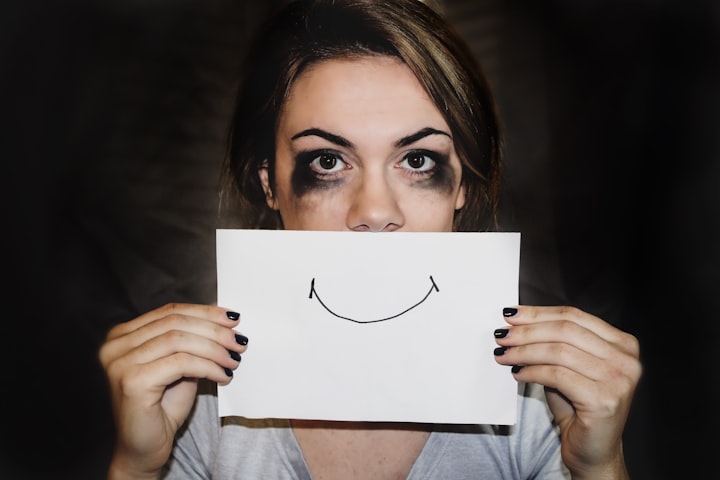Depression is an insidious disorder that tries to convince you that it is a permanent part of who you are
But the essence of disorder is that it is disordered. Your thinking is not working properly, so you don't have to believe it

Depression is an insidious disorder that tries to be a part of your personality
Your depression is lying to you. It tells you that you are a depressed human being. That by some ill glance of fate, that you drew the short genetic straw, and now you're stuck with feeling depressed, and crappy, and down for the rest of your life. Or at the very best, coping with depression. Your depression has told you that you are broken, deficient, flawed, but you are not. The essence of a disorder is that it's disordered. So that means that the organ that isn't working is your brain. That means that your thinking doesn't work right. The essence of a depressive disorder
is when you're feeling hopeless about
something that could actually work. It's when you're sad about something even when things are fine, it's when you're completely distraught when things are moderately sad. And depression changes the way we think. But for some reason, we as a culture believe it. Like we'd love to believe in chemical imbalances, and be born this way, but we get offended when someone says hey did you know that's treatable? As if they're insulting us. Like telling us that we're a failure. Depression that lies to you when it tells you that there's nothing that can be done. Or it says you just have to suffer, or when it tells you everyone's out to get you, or that you're a terrible human being, that if people got to know you they wouldn't like who you are deep down. But depression's favorite lie is who you are. This is
some inherently permanent flaw in your makeup. Now at this point, you may be wanting to click away because it seems like I'm saying that you're making up for your depression. As if I'm saying get over it. But that's also one of depressions lies, to polarize everything. Black and white thinking says that either I'm sympathetic, or hateful. So depression is real, you don't want to feel this way, and you don't know how to get out of it or you would. Depression is real, but it's an experience, not an identity. It's something you go through, not someone you are. So there's a problem with how we use language around mental illness. For example, the most common way to say it is, I am depressed. But people don't walk around saying, I am cancerous. They say I have cancer, or I'm fighting cancer. But they don't make it into their defective identity, and that's where depression color's your perception of yourself, and it's lying to you. Research shows that two people with the exact same genes, growing up in the same environment, are twin studies. If one of them has
depression, the other has a 37 percent chance of also developing depression. So genetics definitely play a role, but the other 63 percent is experiences, choices, and other factors. And even within that 37 percent, some of that is environmental in other factors. Basically that means that we have a huge ability to influence our mental health. I believe that some people are born with tender hearts, some people are born caring a lot, some people are born with a huge capacity and sensitivity for emotion, but I've yet to meet a baby who was born depressed. And that doesn't mean
it's not necessarily genetic, but it means that
depression develops as a combination of our biology, experiences, choices, and development, how we develop. When we aren't given the tools to deal with our heart, our tenderness, our concerns, our dreams, and our hurts, then those pure and sometimes beautifully painful emotions get turned into depression. Depression is real, but it's not who you are. You may feel discouraged about this because you've tried a few things, and the depression hasn't gone away. Don't give up. I wish everyone knew that there are so many things you can try, so many different treatments that may help. Depression is real, but it's also treatable. New research is showing that depression is so much more than a chemical imbalance. It's a combination of many factors that may include biological factors, and chemical imbalances, but there's also the psychological, and the social factors, and other biological factors. And those factors can be treated in so many ways. So let me just list a
a few of the research back to treatments for depression. So therapy actually changes brain chemistry and structure. Medication is an option, exercise. It's shown to be more effective than medication at treating anxiety. Nutritional changes, depression has been directly linked to nutritional deficiencies, and shown to be treatable through a healthy diet. Treating insomnia and improving sleep. In one study of people with depression, eighty-seven percent of people who resolved their insomnia, saw significant improvements in their depression. Many saw their depression symptoms disappearing in eight weeks. Light therapy, treating underlying medical conditions. So this is some of the other biological
factors other than this idea of a chemical imbalance. So there's underlying medical conditions that look like depression, and a lot of side effects of medication include depression. So the thyroid disorders, diabetes, lyme disease, food allergies, anemia, vitamin deficiencies, sleep apnea, etc. All of those medical conditions can manifest like depression. So if we treat those underlying medical conditions, the depression can go away. Other effective treatments include mindfulness, meditation, and willingness. Which is a skill directly from acceptance and commitment therapy, relaxation skills, and learning to turn on your parasympathetic
nervous system, existential therapy. Which is finding
purpose and meaning in your life. Relationship therapy, gratitude practice, building healthy social connections, and many many more approaches have been shown to be effective at treating depression. These include ECT, transcranial magnetic stimulation, nature and adventure therapy, lifestyle changes, psycho education, self-help books, and spirituality. So there's a huge list. I'm not trying to overwhelm you, but I'm trying to say, there is hope for treatment and there's hope for feeling better. If you've tried a few things and they haven't worked, try some other things. Right there's more options than just the one or two things that most people try. And when it comes to therapy, there are over 500 different models of therapy. So you might have to try a few to find a therapist and an approach that works for
you, but don't give up. New neural imaging shows that changing how we think and act actually changes our brains structure, function, and chemistry. Our brains are incredibly moldable, and changeable, even through adulthood. And I've got a course detailing many of those treatments, and how exercise, and light therapy, and other stuff, changes brain chemistry. So that link is in the description below. But the bottom line is, depression is treatable. Don't listen to its lies telling you that this is who you are, and it's never going away. Start working on it to find the combination of changes to your thoughts and actions that can make a difference. A good therapist can help that journey go more smoothly for
About the Creator
brahim jbari
If only it had been described as a vague dream






Comments
There are no comments for this story
Be the first to respond and start the conversation.